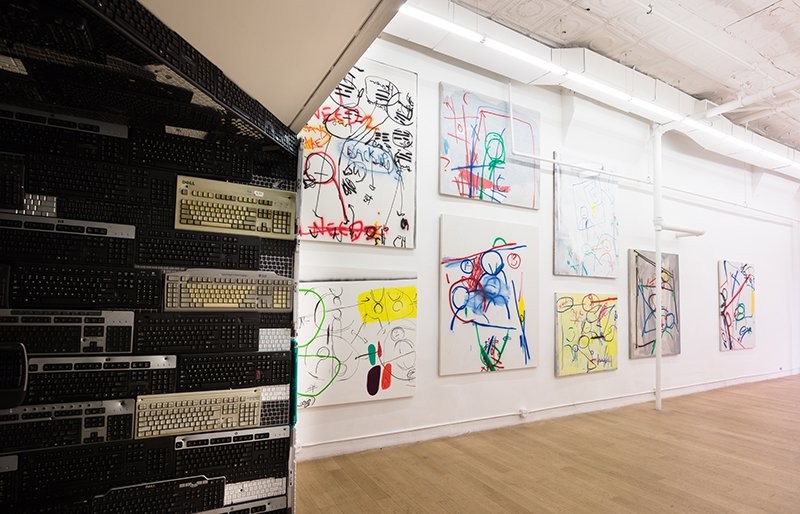Luke Murphy
20 Feb - 20 Mar 2016
LUKE MURPHY
Unhappy Users
20 February - 20 March 2016
CANADA is pleased to present Unhappy Users, Luke Murphy’s fourth solo exhibition with the gallery. The exhibition includes a new body of diagrammatic paintings in the front room and seven digital animations in the main gallery space. Viewers shift between these two worlds, one analog and the other technological, through a tunnel lined with keyboard e-waste. In Unhappy Users, Murphy sets up a tension between painting and programming, and searches for a quasi-spiritual user experience by tinkering with the codes and systems inherent to each.
Murphy approaches his painting surfaces like an engineer with a white board. He draws diagrams as though working out a drawing problem. Hangman figures look, point, click, amidst arrows that suggest networks or systems. The painting space is energetic but unsettled, with almost indiscernible ‘Ah-Ha!’ moments buried under shorthand. They are redolent of programmer’s conference room sketches-- or so-called user-interface diagrams--a mode of communication native to Murphy’s former career in the tech world.
In the main room, LED matrix panels stream patterns of illuminated color. Each screen is a blinky, digital circus that recalls a sign from the corner bodega or Halal truck. Murphy programs these signs with motifs from Modernist painting: Jasper Johns’s Stroop tests scroll by and Stella’s squares flash in brilliant and intricate sequences. Emoticons dance across the composition, as iconic as a Johns’s flag painting but with the humor of a broken announcement board on the subway.
In one animation, The Unhappiest Viewer, Murphy presents a meta-museum where an emoticon figure plays docent and opines incessantly. The talking head blocks our view of the animated painting behind it and clouds rather than clarifies, purposefully obscuring the art experience. Adopting the absurdity of a bouncing pop-up ad, The Unhappiest Viewer creates delight out of distraction and produces a trance-like effect, reminding us that to seek new information from the screen can be an exercise in futility.
Unhappy Users
20 February - 20 March 2016
CANADA is pleased to present Unhappy Users, Luke Murphy’s fourth solo exhibition with the gallery. The exhibition includes a new body of diagrammatic paintings in the front room and seven digital animations in the main gallery space. Viewers shift between these two worlds, one analog and the other technological, through a tunnel lined with keyboard e-waste. In Unhappy Users, Murphy sets up a tension between painting and programming, and searches for a quasi-spiritual user experience by tinkering with the codes and systems inherent to each.
Murphy approaches his painting surfaces like an engineer with a white board. He draws diagrams as though working out a drawing problem. Hangman figures look, point, click, amidst arrows that suggest networks or systems. The painting space is energetic but unsettled, with almost indiscernible ‘Ah-Ha!’ moments buried under shorthand. They are redolent of programmer’s conference room sketches-- or so-called user-interface diagrams--a mode of communication native to Murphy’s former career in the tech world.
In the main room, LED matrix panels stream patterns of illuminated color. Each screen is a blinky, digital circus that recalls a sign from the corner bodega or Halal truck. Murphy programs these signs with motifs from Modernist painting: Jasper Johns’s Stroop tests scroll by and Stella’s squares flash in brilliant and intricate sequences. Emoticons dance across the composition, as iconic as a Johns’s flag painting but with the humor of a broken announcement board on the subway.
In one animation, The Unhappiest Viewer, Murphy presents a meta-museum where an emoticon figure plays docent and opines incessantly. The talking head blocks our view of the animated painting behind it and clouds rather than clarifies, purposefully obscuring the art experience. Adopting the absurdity of a bouncing pop-up ad, The Unhappiest Viewer creates delight out of distraction and produces a trance-like effect, reminding us that to seek new information from the screen can be an exercise in futility.

